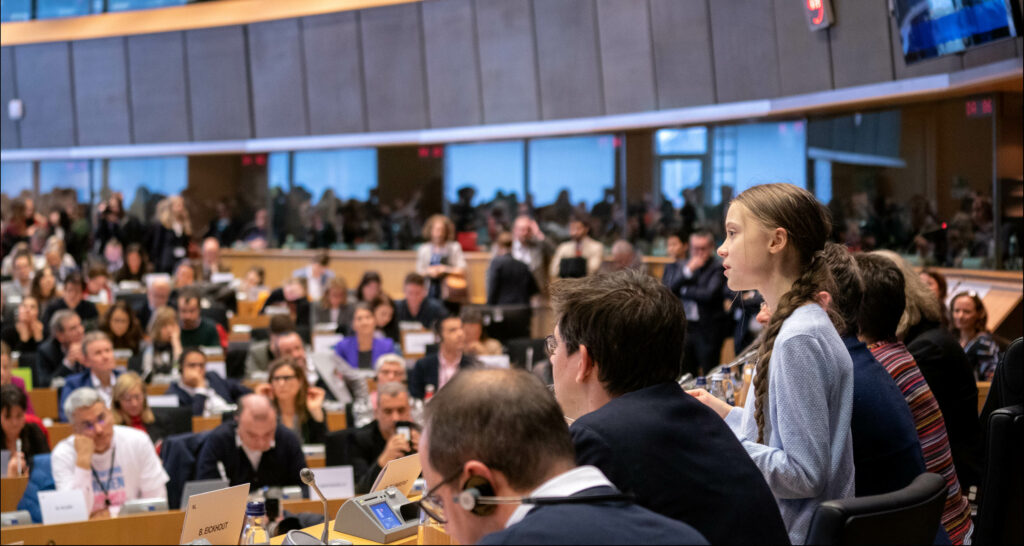Acting on science: the urgent need to fix policymaking to save the planet
As political mantras go, “we’re guided by the science” ranks high. Yet established policymaking structures mean scientific considerations are often marginalized. We need bold reform now to place science genuinely at the heart of decision-making
Climate — Global

“I don’t want you to listen to me. I want you to listen to the scientists. I want you to unite behind the science. And then I want you to take action.” The words are Greta Thunberg’s from her powerful address to the United States Congress in 2019, urging legislators to do what is needed to reach the Paris Agreement target to limit global warming to well below 2°C, preferably to 1.5°C.
Greta, like many other young people, has questioned and criticized the inaction by politicians and other decision-makers. And rightly so.
Because why is it that (putting aside a few notable exceptions in recent years) most politicians claim to follow science, and yet so many have the weight of scientific opinion against them? What can be done to create a more constructive relationship between science and government?
The inconvenient truth
The key to understanding this paradox of inaction lies in the motives that drive politicians. Legislators are a heterogenous group, with various policy narratives and value systems. In liberal democracies, where they are up for election once every four to five years, public opinion counts, and many competing interest groups will be fighting for their attention.
In my conversations with parliamentarians all over the world about how we can accelerate political action for the Sustainable Development Goals (SDGs), I hear many variations of the same argument: that jobs depend on the oil/gas/coal/agricultural/heavy industry, hence it would be political suicide to campaign for climate action. Or, particularly in the Global South, as long as people cannot feed their families and do not have access to electricity, talking about global issues such as climate change is a luxury no one can afford.
Scientific opinion is not always the same as public opinion, nor in the interest of powerful stakeholders and potential campaign funders. Fifteen years after Al Gore’s film “An Inconvenient Truth,” its title is, tragically, still spot on. Science presents politicians with an inconvenient truth, because it is not opportune for them to act upon it.
Outdated economic models
There are, however, true leaders among our elected representatives who understand the significance of science-based policy. These pioneers are willing to challenge public opinion and show leadership in their communities. But they face challenges inside the political system: not just by political opponents, but also by rigid and outdated economic models that dictate which policies are considered good investments and which are seen as red (negative) numbers on the bottom line. Spending on clean air, clean water, biodiversity, climate adaptation, and prevention of climate change often come out as red numbers, as the cost of inaction is not part of the metric.
These models have not been updated according to the science, and this contributes to the lack of multisectoral buy-in. The models are not multidimensional, do not encourage legislators to think outside of their specific sectors and do not consider the cost of inaction, such as the cost of environmental degradation. This is why many good policy initiatives are blocked due to lack of initial funding.
Lost in translation
To move towards science-based policy, the scientific community must be able to operate according to these dynamics. It is not enough to present solid scientific evidence, data, and facts that are continuously ‘lost in translation’ in the meeting with habitual thinking, competing narratives, and a political culture of ‘who strikes first.’
It is encouraging to see examples of academic institutions around the world beginning to break down silos and work across the sciences, arts, and humanities and take on a more forward-leaning role. Alliances with other stakeholders, grassroots movements, and activists are needed to further align public opinion with scientific opinion. As an example, Columbia University in the City of New York has defined a fourth purpose, besides research, education and service. It is:
“The advancement of human welfare through the complex process of merging scholarly knowledge and our distinctive intellectual capacities with groups and institutions beyond the academy that respect what we do, possess the skills and power to bring about change, and are dedicated to doing that work in partnership with us.”
It is necessary to use different channels and ‘messengers’ to translate the science into actionable policy design that legislators can transform into action.
Strengthening the science–policy nexus
As academic institutions must redefine their role, so must parliaments. While governments often have well-defined channels to draw on the scientific community, legislators do not have access to the same established scientific networks. Institutionalizing the dialogue between the scientific community and legislators can ease the introduction of evidence-based information into the political realm, encourage productive discussion and debate among legislators, and promote multisectoral collaboration. Regular dialogue will also help the scientific community understand the political processes of creating and implementing policy, empower them to present holistic rather than fragmented evidence, and view legislators as partners and colleagues rather than one-dimensional or untrustworthy individuals.
Ideally, parliaments should establish structures and mechanisms to institutionalize this nexus and provide the structure for the dialogue to take place on a regular and systematic basis. In the absence of this, other actors might support that dialogue to happen.
Think tanks and do tanks, interest organizations, and councils are working to strengthen the science–policy nexus by creating a space for the scientific community to engage with policymakers. This can increase the mutual understanding of what information is needed, and provide economic, social, and environmental perspectives of the scientific evidence, as well as address the bottlenecks that keep evidence from influencing policies.
By using the SDGs to guide their research and policy advice, these groups have been able to ensure that policies that advance the progress on environmental and health goals do not hinder economic growth. They have also identified how policies promoting affordable and clean energy, and responsible consumption and production can accelerate economic progress.
Councils and platforms like the International Science Council and the Intergovernmental Science-Policy Platform on Biodiversity and Ecosystem Services (IPBES) are providing policymakers with scientific assessments about natural and social sciences and are suggesting tools and methods to protect natural resources and global sustainability. They are focused on catalyzing international scientific expertise to effectively integrate science into policy and public action.
The Sustainable Development Solutions Network (SDSN) Europe is facilitating the policy–science nexus by presenting evidence and providing policy recommendations from economic, climate change, and equity perspectives. SDSN Europe’s report, Transformations for the Joint Implementation of Agenda 2030 for Sustainable Development and the European Green Deal is guiding the European Union’s COVID-19 economic recovery, the region’s plan to achieve the SDGs and the implementation of the European Green Deal. It is doing this by providing actionable strategies for policymakers that align with their values and goals, such as ensuring their constituents’ job security.
Parliamentarians for the Global Goals (PfGG) is connecting parliamentarians all over the world with global thought leaders and experts in collaboration with SDSN with an ambition to establish national fora for dialogue among legislators and academia. These fora will help develop concrete policies and campaigns for the SDGs and encourage cross-party dialogue and collaboration. They will also strengthen the exchange of ideas between academia and legislators to accelerate political action for the 2030 Agenda and increase the localization of the SDGs.
Wake-up call
It is remarkable that a Swedish teenage activist has had more luck, or skill, than most scientists to get the attention of decision-makers and the media to advocate for science-based policy. It is also a wake-up call and lesson about the missing links, the failure of our traditional structures, to bridge the gap and translate what we know into what we do.
Recalling the words of Greta Thunberg, she and her generation are asking us to “act as you would in a crisis. I want you to act as if our house is on fire. Because it is.”
In times of crisis, we need courageous leaders who are willing to take risks and put their own personal gain aside, to go against public opinion if needed, to do what is right. We need innovation and thought leadership to replace old models with new ones for a new reality. And we need to mobilize – together.





